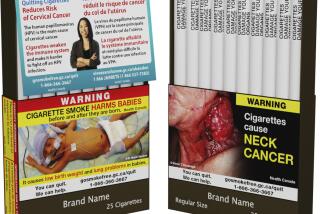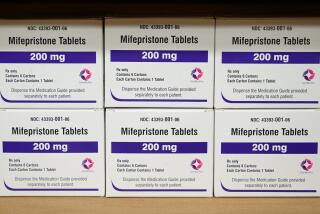Warning: Clarity ahead
- Share via
ONCE UPON A TIME, the stupendously confusing labels that come with prescription medications were actually meant to help doctors better understand a drug and what side effects deserved a mention to their patients. Somewhere along the line, however, too many lawyers got involved and added every warning they could think up -- the spectacularly unhelpful “if you are allergic to this medication, don’t use it” is popular -- in the hope that superfluous forewarning could protect drug makers from lawsuits. (Don’t tell hypochondriacs, but that means many side effects listed on medications have little science behind them.)
The problem with this strategy, other than its absurdity and uselessness, is that research shows nine out of 10 doctors today don’t read drug labels, a development that has undoubtedly led to a significant number of medical errors. Up to 300,000 people are harmed every year by medical mistakes, many involving the misuse of medications.
After reviewing the issue for five years, the U.S. Food and Drug Administration issued new rules last week to simplify drug labels. Under the changes, which take effect later this year, drug labels will look more like food labels, with a short highlight section at the beginning summarizing safety warnings, proper uses and doses for patients and advice about what doctors should say to their patients.
More good news: The change is likely to affect the indecipherable way drug companies advertise to consumers in print and on television. Just where do they get those actors who can speed through an hour of information in a 30-second TV spot? Expect all of that to get much simpler.
Of course, not everyone is happy. To help quell drug companies’ fears that they may be open to more lawsuits under the new, streamlined rules, the FDA has included an addition to its drug preamble that spells out six claims plaintiffs can’t lodge against drug makers.
Plaintiff’s attorneys and many states, which set their own drug liability laws, have cried foul. They worry that the new federal rule will diminish legal-liability laws. In reality, however, the new wording is not the last word on the issue; it will be up to courts to decide if the changes actually weaken tort claims.
Regardless, it is good news that the federal government has finally taken on an admittedly arcane but important issue.
In recent years, there have been too many examples of drug companies -- and the FDA -- not being upfront with the public about the true efficacy and safety of the country’s drug supply. Giving consumers clearer and more honest information is a small but useful step in the right direction.
More to Read
Sign up for Essential California
The most important California stories and recommendations in your inbox every morning.
You may occasionally receive promotional content from the Los Angeles Times.












